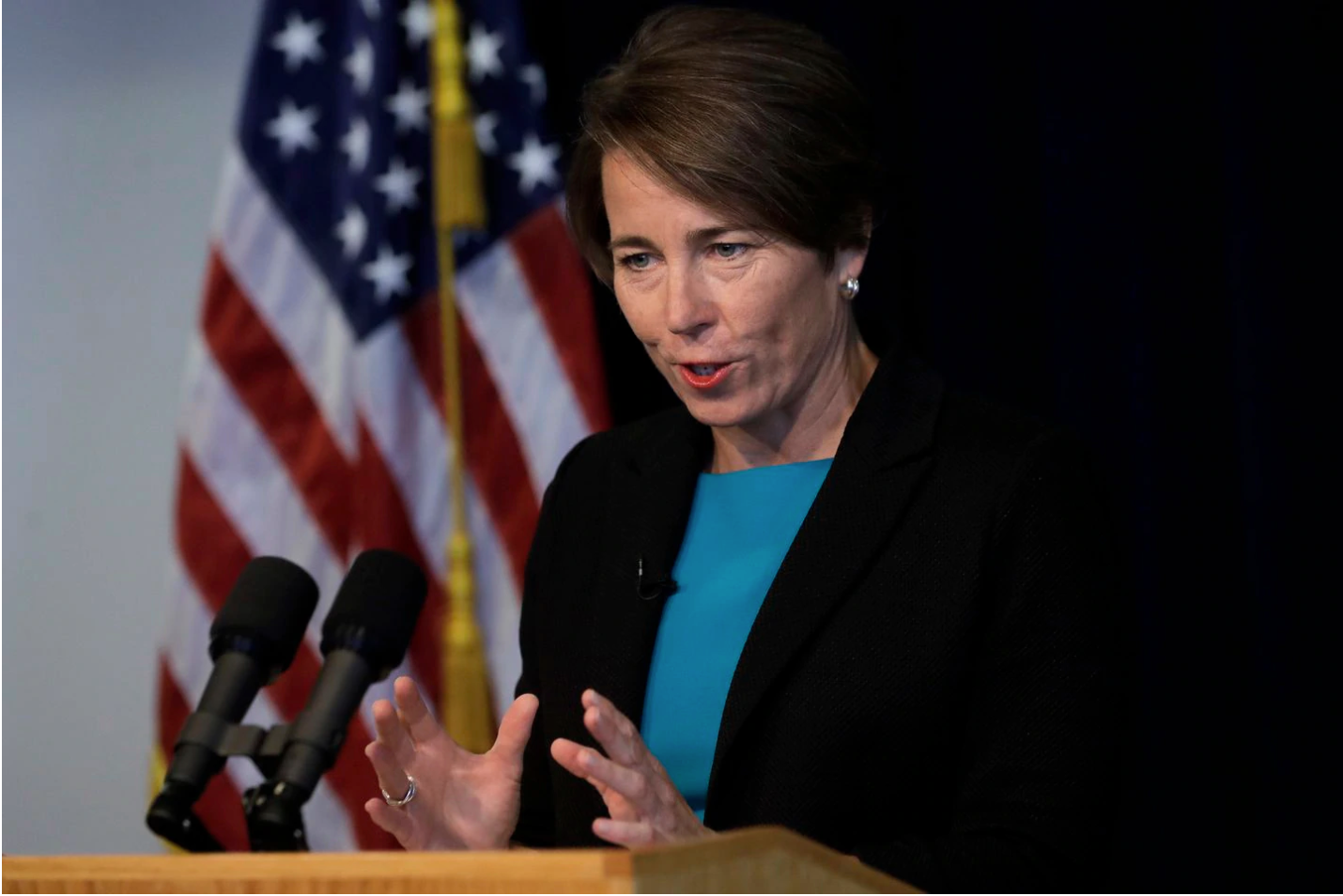by Shelley Murphy
via Boston Globe

In a statement, Massachusetts Attorney General Maura Healey (pictured last September) said the ruling will result in millions of dollars in financial relief and marked the first time a federal court has ordered a “borrower defense discharge” of federal student loans.STEVEN SENNE/ASSOCIATED PRESS/FILE
A federal judge has ordered US Department of Education Secretary Betsy DeVos to cancel the student loan debt of more than 7,200 Massachusetts students who attended Everest Institute, part of Corinthian Colleges’ defunct national chain of for-profit schools, capping a prolonged legal battle.
In a 73-page decision, US District Judge Leo T. Sorokin ruled that the Department of Education must approve a 2015 application by Massachusetts Attorney General Maura Healey seeking a discharge of the students’ federal loans based on allegations of widespread illegal conduct and deception by Corinthian. The order also applies to Parent Plus loans obtained on the students’ behalf.
“Thousands of Massachusetts students cheated by Corinthian have finally had their day in court, and they have won,” Healey said in a statement Friday. “This landmark victory for students will cancel the federal loans for thousands of defrauded borrowers, mostly Black and Latinx students, targeted by a predatory for-profit school and abandoned by Secretary DeVos and the Trump Administration. For five years, our office and the Project on Predatory Student Lending have fought to win students the relief they deserve and today we have won decisively.”
Healey said the ruling will result in millions of dollars in financial relief and marked the first time a federal court has ordered a “borrower defense discharge” of federal student loans. Borrowers may be eligible to have such loans forgiven if the school misled them or engaged in other misconduct.
The ruling was issued in a case the Project on Predatory Student Lending Legal Services Center of Harvard Law School had filed on behalf of five students who had attended Everest Institute, which had campuses in Brighton and Chelsea. It went bankrupt in 2015 after running afoul of state and federal regulators.
In his ruling, Sorokin granted the plaintiffs’ request for class-action status, expanding his order to include more than 7,200 students who attended the school.
“This ruling is a clear and powerful statement of the rights of student borrowers, and a resounding rejection of the Department of Education’s ongoing and across-the-board refusal to recognize these rights and cancel fraudulent student loans,” said Toby Merrill, who directs the Project on Predatory Student Lending.
She said 80 percent of students at Everest were women and more than three-quarters were Black or Latinx. She said they have been struggling to pay debts that courts had previously declared invalid.
Corinthian’s demise followed numerous investigations for misconduct, including a multi-year probe led by the US Department of Education that resulted in a $26.6 million fine for falsification of job placement rates at Corinthian campuses in California.
In 2014, Attorney General Martha Coakley sued Corinthian, alleging they used aggressive and deceptive marketing and loan tactics to boost enrollments and profits. Corinthian pushed students to take out subprime loans through the school, which charged interest rates as high as 18 percent, so they could qualify for federal student loans, Coakley alleged.
In 2016, a state Superior Court judge found the school had violated the Massachusetts Consumer Protection Act and ordered Corinthian to pay more than $67 million in restitution.
Yet the Department of Education continued to collect payments from students. In some cases, the department seized students’ tax refunds when they failed to pay.
In 2018, in another suit brought by the Project on Predatory Student Lending, Sorokin ruled the Department of Education had illegally taken tax refunds from two students without addressing Healey’s assertion that their loans were fraudulent and unenforceable.
But the Department of Education has refused to acknowledge the state’s application and continued to collect on Corinthian student loans, Healey said.
Former Corinthian students had delinquent or defaulted federal loans listed on their credit reports, had their financial and educational opportunities negatively affected, and have been limited in their ability to obtain employment and housing, authorities said.
In October, Healey sued Devos, alleging the Department of Education illegally failed to consider the application she filed four years earlier.
Filed in: In the News, Legal & Policy Work
Tags: Betsy DeVos, Department of Education, Maura Healey, Predatory Lending and Consumer Protection Clinic
Contact Office of Clinical and Pro Bono Programs
Website:
hls.harvard.edu/clinics
Email:
clinical@law.harvard.edu